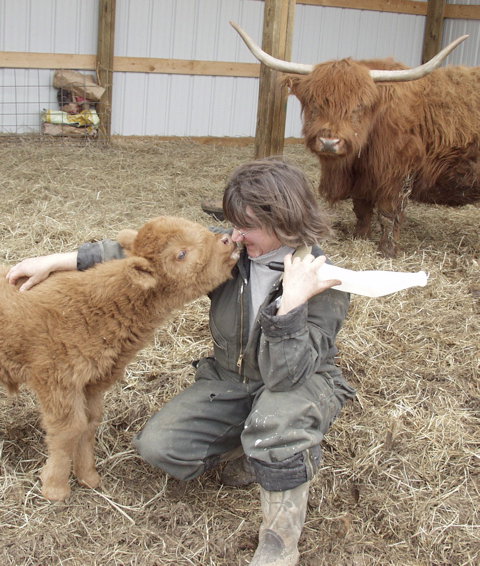We have always used the Angus bulls on the ranch to breed Daphne. A small heifer bull is what you want for a 1st cal heifer. We had to pull Daphne’s first calf although that bull was a small but very muscular pet named Peanut. My plan was to raise the heifers to sell for family cows but all Daphne ever had was bull calves. We banded them. That is, when the calf is a few days old you wrestle it down and but a special kind of rubber band above the testes. They go numb and fall off, no blood, pain or flies. I sold all these big steer weanlings at auction for more $ because they were black like Angus and not showing so much much dairy character.
This latest calf one month ago Daphne produced a half Angus heifer calf. She is cinnamon colored with big black rimmed eyes, long eyelashes and her mothers disposition. Since Daphne is getting on in years I will keep this one for my next house cow. Her name is Lilly of the Valley.
Here is the problem with modern dairy cows- in my experience they can’t raise their own calves. Modern dairy cattle have been bred to be milk machines not mothers. Their teats are way down around their hocks, not tucked up under the flanks like beef cows and as nature intended. The calves must have colostrum within the first 12 hours of life for their immune systems to function. The little claves instinctively and continuously search up around the cow’s flanks. I have had to go buy colostrum and force it down them by making them take a bottle. This has happened with every calf.
Another thing- Because of dairy cow udder edema milk does not flow well through the tubules until the edema goes down. So I give them bottles of milk replacer just to keep the calf alive long enough for it to figure out the udder. This has happened with all Daphne’s calves. I don’t mind and it makes them tame and easy to handle and halter break without a rodeo. You just have them on a lead and following for the bottle. If people are not interested in milk, and regular milking, milking hygiene, making cheese, yogurt, butter and icecream is a full time job, it is best to get a steer calf that is already imprinted on people. Such as a kid’s 4H project or a bottle calf.
About keeping cattle with horses- cattle do push and break mesh fences, even barb wire fences, determined butting with their heads to get the grass on the other side. Cattle don’t eat the grass around their own pies but eat the grass around horse piles so these two types of stock can be rotationally grazed. Cattle will clean up wasted hay that horses don’t want. Playful male horses will chase and harass calves. I keep my mini stallion away from Daphne’s calves because he might hurt them and break their legs. Horned cattle I would not trust in with horses because if horses can get hurt they will. Although Daphne has no horns and Angus cattle are naturally polled. When no small calves are with Daphne the horses and cow get along fine.
Daphne is actually more of a pet than a horse. She sleeps near the front door and stands at the window and watches TV at night.

 so she might have gone a different direction there. She also had a couple of small home bred steers her kids were training as oxen to pull things. I haven’t seen her current farm IRL, it’s FB, so I’m thin on details.
so she might have gone a different direction there. She also had a couple of small home bred steers her kids were training as oxen to pull things. I haven’t seen her current farm IRL, it’s FB, so I’m thin on details.